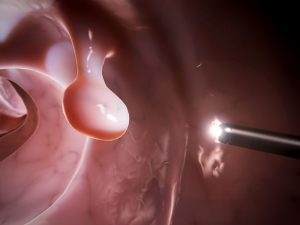Bleeding in your gastrointestinal (GI) tract is often a symptom of a larger issue in your digestive tract. If you have gastrointestinal bleeding, you may notice blood in stool or vomit. However, it is not always visible. Our team at Colon & Rectal Surgical Specialists of New York can assess your symptoms and perform discreet, comfortable diagnostic tests to determine the cause of GI bleeding. You can then undergo treatment at one of our convenient locations. We have offices in East Setauket and Garden City, NY, as well as throughout Brooklyn.
Often, the first indication of GI bleeding is blood in the stool or vomit. In some cases, this blood may be bright red or maroon, or change the color of your stools so they appear black and tar-like. Other patients may experience vomit that looks like coffee grounds.
If you are suffering from a GI bleed, you may also feel:
Loss of blood can also cause a pale appearance. The symptoms you experience are often related to where the bleed is located within your GI tract.
In this video, Dr. Cesar Sanz of Colon & Rectal Surgical Specialists of New York explains why patients who are experiencing rectal bleeding should be examined by a doctor. Rectal bleeding can occur as the result of many conditions, including hemorrhoids. At CRSSNY, our specialists provide expert diagnoses when patients experience rectal bleeding.
See more videos
A number of digestive disorders can cause GI bleeding, including:
If you have any of these conditions, you may be at a higher risk for developing a GI bleed. Identifying the cause of bleeding in your digestive tract is an essential step in determining the right treatment for you.
During your consultation, your colorectal specialist will start by asking about your symptoms. They will also perform a thorough physical examination. We may do some blood tests as well. In some cases, an initial exam is sufficient to determine the cause of the issue. If not, we can perform tests such as:
For your comfort, our specialists can perform most of our tests under sedation. These noninvasive or minimally invasive exams can pinpoint the source of GI bleeding. In some cases, we can diagnose and treat your condition using the same procedure.
Your colorectal specialist will discuss all of your options with you and recommend the most conservative and effective procedure for your needs.
The treatment your specialist recommends will depend on the underlying cause of the bleeding in your digestive tract. At Colon & Rectal Surgical Specialists of New York, we have a state-of-the-art ambulatory surgical center equipped with the latest technology, and we use advanced endoscopic techniques. Our methods can promote faster healing and minimize discomfort both during and after your procedure.
Common procedures used to treat a GI bleed include:
Your colorectal specialist will discuss all of your options with you and recommend the most conservative and effective procedure for your needs. Some treatments can be performed in combination to provide comprehensive results.
When left untreated, internal bleeding can have serious consequences for your health. Our colorectal specialists can identify the cause of GI bleeding and provide targeted treatment to alleviate your symptoms. Learn more by contacting us online or calling one of our convenient locations today.